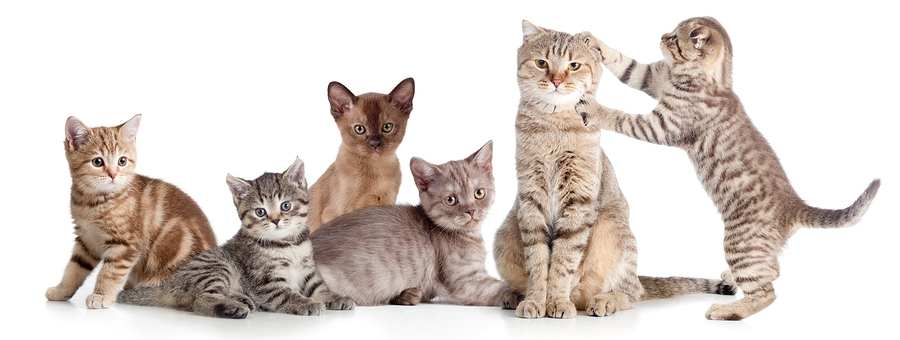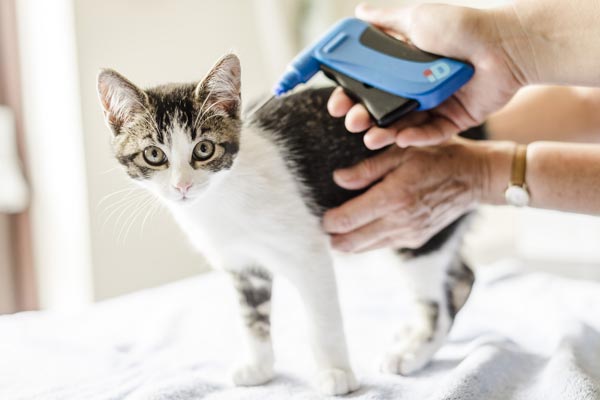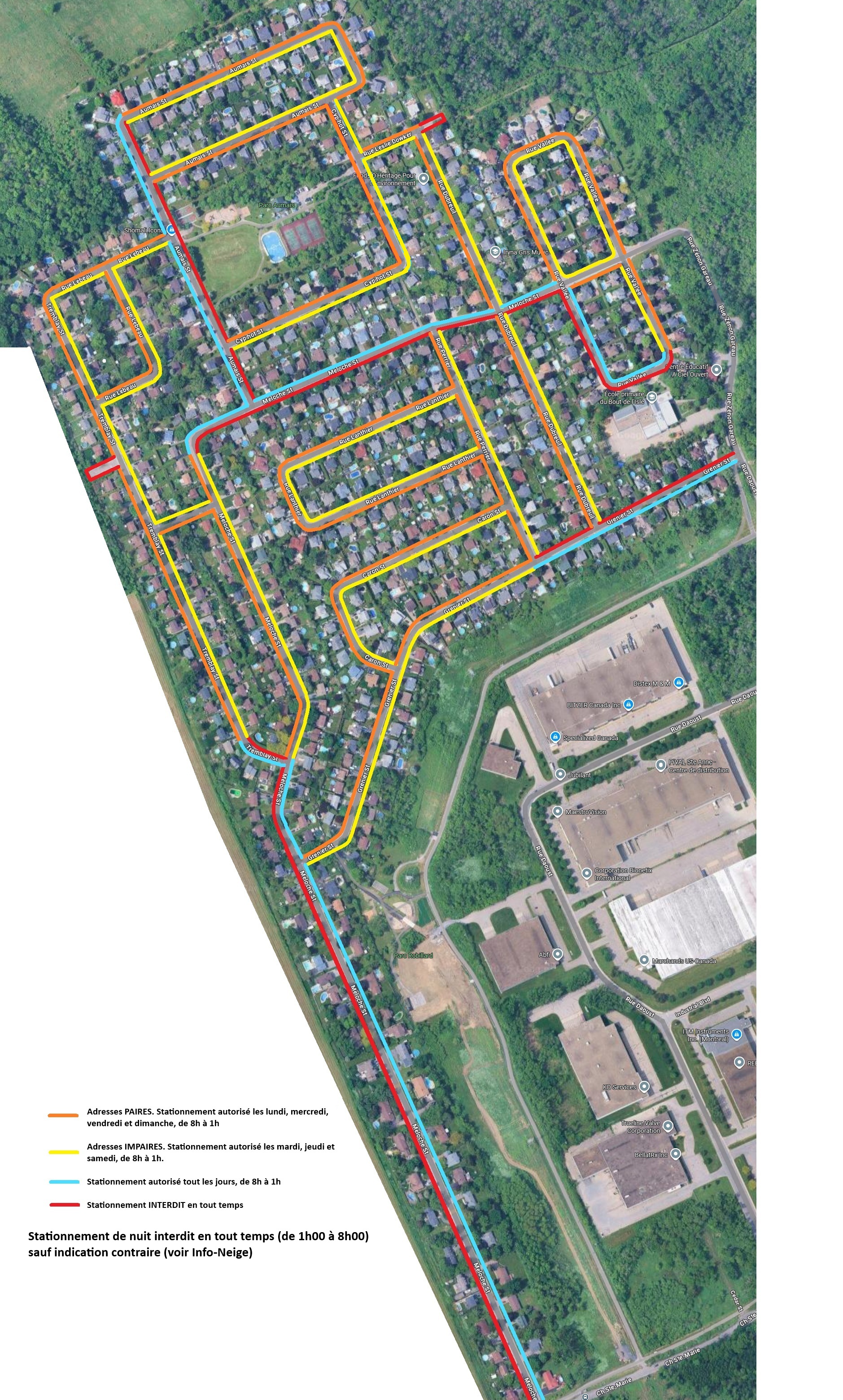Cats
Bylaw Regarding Cats

At the regular meeting of City Council held on February 11, the Council adopted By-law 809 regarding cats. The purpose of this by-law is to supervise the possession of domestic cats and to limit the presence of feral cats on the Sainte-Anne-de-Bellevue territory.
Main provisions of the Regulation
Number of authorized cats
It is forbidden to keep more than 4 cats in a dwelling unit. It is forbidden to operate a cattery on the territory of the City. However, when a cat gives birth, kittens can be kept for a period of up to 3 months.
License and medal
The owner of a cat, with the exception of a community cat, must obtain the mandatory license and medal (valid for the duration of the cat's life), issued by the City. When applying for a cat license, the owner must provide their surname, first name, address and telephone number. They must also give the breed, gender, weight, color, year of birth and name of the cat. The person making the request must present a valid photo ID and proof of residence.
As of January 1, 2020, the applicant must submit proof of sterilization and evidence that the cat has a microchip, or written evidence from a veterinarian that either of these interventions is contraindicated for the cat.
Anyone with custody of a cat must ensure that it wears its medal at all times when outside the residence. It is the cat owner's responsibility to notify the City of any change of address and in the case of the death, disappearance, sale or donation of the cat within 30 days of such change.
Get the Cat License Application.
Nuisances
- It is forbidden to leave a cat outside without his mandatory medal, except for a community cat
- It is forbidden to let a cat cause damage to the public property or to the property of others
- It is forbidden to keep one or more cats in a dwelling unit when their presence creates odors likely to inconvenience the neighborhood
- It is forbidden not to pick up by any means the urine or faeces of a cat on private or public property
- It is forbidden to let a cat meow so as to disturb the peace or tranquility of a person
- It is forbidden to let a cat attack, bite, attempt to attack or bite a person or any other animal
- It is forbidden to leave a cat on private land without the consent of the owner or occupant of the land
- It is forbidden to move, alter or break the objects or tools put in place under the Feral Cats Program
Sanctions
- First offense: a minimum fine of $ 200 plus fees
- Second offense: minimum fine of $ 300 plus fees
- Subsequent offense: minimum fine of $ 400 plus fees
Types of cats
Community cat or feral cat: a cat living in a semi-wild state and which can not be confined within a dwelling unit, who has been captured, sterilized, vaccinated and released as part of the CSRM program
Outdoor Cat: Cat that has been acquired or adopted by its owner for the purpose of leaving it outside most of the time
Indoor cat: cat that has been acquired or adopted by its owner for the purpose of leaving it inside a housing unit most of the time
Stray cat: a cat that is outside a dwelling unit and does not have a medal that identifies it
Mandatory Medal
The owner of a cat must obtain a medal issued by the City. Anyone with custody of a cat must make sure that it wears the medal at all times while outdoors.
Cost of the medal: $ 20, valid for the duration of the cat's life
NOTE: All cats must have a medal, including indoor cats. It is not uncommon for a cat usually kept indoors to leave the house without the knowledge of its guardian. It is therefore essential that it may be identified.
Mandatory Sterilization
As of January 1, 2020, it will now be mandatory to sterilize all cats present on the territory of Sainte-Anne-de-Bellevue. Proof of sterilization will be required at the time of purchase of the medal.
Why sterilize your cat?
There is consensus among animal experts that sterilization is essential in the responsible management of pets.
Benefits of sterilization:
- Avoid unwanted behaviors. A sterilized pet will have fewer hormonal behaviors such as urine marking, territorialism, homelessness and fighting
- Greatly reduces urinary marking
- Eliminates symptoms of heat in females (bleeding, meowing, agitation)
- Helps control the population by limiting unwanted litters. You should know that a cat gives birth to five or six kittens and that several gestations can occur each year. Sterilization therefore reduces the number of orphans who do not find homes for adoption and prevents them from being euthanized
Well aware of the need to show Quebeckers that veterinarians are very concerned about the large number of animal abandonments, the Association des médecins vétérinaires du Québec en pratique des petits animaux (AMVQ) initiated the National Week of animal sterilization in Quebec (SNSAQ) and has kept it going for the last 6 years

Sterilization Hurts Animals


Preventing pain is a priority for veterinarians. The animals are placed under general anesthesia and are given analgesic before and after the operation. For females, veterinarians also prescribe an anti-inflammatory for the days following surgery.
Sterilization is Beneficial for Animal Health

Sterelization is actually thought to prevents several diseases (including infections and cancer) and helps to increase the life expectancy of animals.
Sterilization Changes an Animal's Personality

No scientific study proves that sterilization would have any significant effect on the personality of animals. However, a sterilized pet will have fewer hormonal behaviors such as urinary marking, territorialism, roaming and fighting.
For Every Person Born, 45 Cats are Born as Well

Indeed, a couple of fertile cats can "produce" more than 8 kittens a year, which themselves will breed. That amounts to a tremendous number of cats and they can not realistically all be adopted. This
is why, unfortunately, euthanasia is the leading cause of death in shelters.
For more information on sterilization, visit the following websites:
SPCA website
The Many Benefits of Spaying Pets
American Society of Prevention of Cruelty to Animals
Mandatory Microchip
From January 1, 2020, it will now be mandatory to provide a microchip all cats present in the territory of Sainte-Anne-de-Bellevue. Proof of microchip will be required at the time of purchase of the medal.
What is a microchip?
It is a very small capsule, about the size of a grain of rice, which contains a computer chip with a unique identification number. It is injected under the skin of the animal, between its shoulder blades, by means of a syringe.
During the intervention, the animal will feel a slight discomfort for a few seconds, but it will fade quickly. Sterilized and composed of biologically inert materials, the microchip is a safe method to identify an animal.
Why Should you Microchip your Cat?
If your cat is lost and has no ID, it is impossible for anyone to contact you or bring your pet home. Most animals lost without ID are end up in shelters and if the owner can not be contacted, the animal may be euthanized. All shelters and vets are equipped with microchip scanners. Thus, any stray or injured animal can be quickly identified, its owner contacted and any necessary treatment can be started without delay.

Benefits of the microchip:
- Unique identification of the animal
- One implantation, good for the entire life of the animal
- Allows to find the animal in case of loss or theft
- Helps resolve disputes over the ownership of an animal
- Helps to save expenses for a stay in an animal shelter
- Decreases the number of unnecessary euthanasia
- Is mandatory to be able to travel to some countries with your pet

The Procedure is Painful for the Animal

Not at all. The injection is a quick and easy procedure that causes only slight discomfort to the animal. In addition, the implanted capsule is inert, sterile and biocompatible. The danger of reaction is therefore minimal.
The Microchip Helps to Find a Lost or Stolen Animal

Thanks to its unique identifier, it is very easy to find the owner of an animal that has a microchip. Anyone who finds the animal can scan the chip in a pet store, shelter or at a veterinarian for free.
The Microchip is too Expensive

The cost of implementing a microchip varies between $ 40 and $ 100, including database registration fees. This cost is valid for the life of the animal. There are also free microchip days, organized by organizations such as the SPCA. All you need to do is find out!
For more information on microchipping, visit the following websites:
Microchipping can help reunite owners with lost pets
La micropuce, parce que votre animal vous est cher (in French only)
Ville de Montréal - Clinique de micropuçage : questions fréquentes
Animals are not consumer goods!
Owning a pet is a lot of responsabilities and costs money:
- A strong commitment for many years to come;
- Covering the costs of sterilization and annual identification;
- Covering the costs related to its food and care (nails, ears, coat, grooming etc.);
- Covering the costs of regular veterinarian care (shots, protection against flees, heartworm, etc.) and unforeseen expenses;
- Covering boarding costs (when on vacation);
- Daily walks (for dogs);
- More frequent house cleaning (pet hair, sand, etc.)...
Moving or going on vacation ?
If you are moving or going on vacation, please don't leave your pet homeless and searching on its own for a new address! Find your pet a new home instead of leaving it to fend for itself.
Contact a local shelter or a local organization!
Be responsible: animals are not consumer goods!
Ressources
If you want more information, visit the following websites:
Cat license application
Cat license application 9 MARCH 2022













